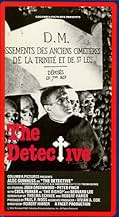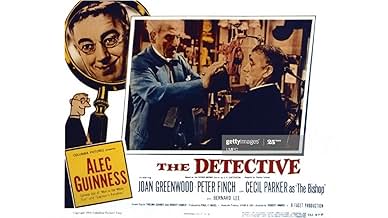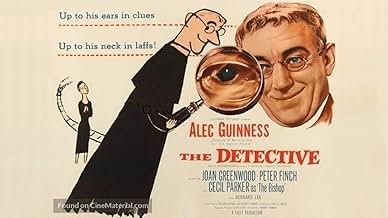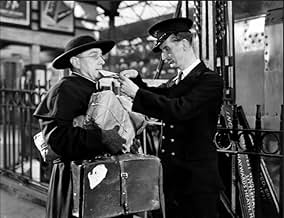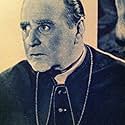Füge eine Handlung in deiner Sprache hinzuWorks of art are disappearing, stolen by a master thief, a master of disguise. Father Brown has two goals: to catch the thief and to save his soul.Works of art are disappearing, stolen by a master thief, a master of disguise. Father Brown has two goals: to catch the thief and to save his soul.Works of art are disappearing, stolen by a master thief, a master of disguise. Father Brown has two goals: to catch the thief and to save his soul.
- Auszeichnungen
- 1 Gewinn & 1 Nominierung insgesamt
- Inspector Dubois
- (as Gerard Oury)
Empfohlene Bewertungen
In his novel "Manalive" there is a moment when the appeal of his paradox reaches a point that is both understandable and questionable. The hero explains that the phrase "All that glitters is not gold" is false - all that glitters is gold. He starts pontificating on how many rarer elements (platinum?) exist that don't glitter as much, so that it is the attraction of the glitter of gold that makes it matter. One reads this discussion hoping that Chesterton is pulling our leg (a hope I still have, but it is very faint). The point of the phrase is that there are more valuable things in the universe than wealth producing items like gold - things like kindness, generosity, love. If Mr. C. was fooling us, I congratulate him on the still hit-on-the-head blow of the paradox. But if he meant it I really pity him.
I leave it to his fans to explain it to me (if they wish). "The Detective" is one of the few movies based on Chesterton's huge output. It is based on the first story of his tales of the Roman Catholic priest and detective, Father Brown: "The Blue Cross". The story is a good one (the first of the first series of "Father Brown" tales), and introduces us to Flambeau, the master thief that Brown eventually saves. But for it to be done properly (not the way the movie quite does it) several of the stories have to be put together. The first three stories of the series deal with Brown, Flambeau, and the head of the Paris police. The last commits a murder in the second story, and commits suicide before Brown exposes him. So much for a guardian of the law. Flambeau is stopped by Brown reasoning with him that he is not a bad man but a man who is on the verge of becoming one if he lets an innocent man take the blame for a theft he committed. Flambeau does repent, and subsequently becomes a detective (and an assistant to Brown).
This is a film which could have been reduced in length. Parts of the movie are quite amusing (the scene of Ernst Theisinger and Guiness breaking each other's eyeglasses is cute). The acting is also good (especially Guiness and Peter Finch as Flambeau). But the moments that move the viewer (and approach Chesterton's Catholicism) are when Guiness gives parables to explain behavior and human weakness. Witness his tale of the bad woman who fails to get pulled out of hell.
I wish the film was not so dull in so many spots, but it is definitely worth a look.
The film itself, featuring a superbly witty script and deft direction, is a thoroughly delightful and occasionally hilarious gem - made by and with several exponents of the famed Ealing style, it's admirably served by a splendid cast. Alec Guinness is at somewhere near his best in the title role (unassuming, accident-prone but uncommonly shrewd and entirely amiable, his influence on future Peter Sellers characterizations - such as the priest in HEAVENS ABOVE! (1963) and Inspector Clouseau - is very evident); Joan Greenwood is somewhat underused here, but she's quite good as an aristocratic widow and Father Brown's confidante; a young Peter Finch impresses as the gentleman thief Flambeau, engaged in a battle-of-wits with Guinness throughout in which the two clearly respect and admire one another - but the rogue is averse to the priest's attempts to redeem him! Other familiar - and welcome - British faces grace the supporting line-up: Bernard Lee as a cop; Sid James as a ne'er-do-well small-time crook; Cecil Parker as Guinness' flustered superior, a bishop; and Ernest Thesiger as a dotty ancient librarian who appears in only one scene, but it turns out to be one of the film's comic highlights. Other memorable moments involve the various disguises Flambeau adopts in his attempts to outwit Guinness, such as in the lengthy catacombs and auction sequences.
Despite Hamer's reputation, this particular film seems to have been somewhat neglected - or, at least, has had its importance downplayed - over the years; in my opinion, along with KIND HEARTS AND CORONETS (1949; undeniably his masterpiece) and IT ALWAYS RAINS ON Sunday (1947; which I only first watched a couple of months back), it stands as the director's finest work. At the time, it was deemed worthy of representing Britain at that year's Venice Film Festival, where it competed against such cinematic heavyweights as Federico Fellini's LA STRADA, Elia Kazan's ON THE WATERFRONT, Akira Kurosawa's SEVEN SAMURAI, Kenji Mizoguchi's SANSHO THE BAILIFF and Luchino Visconti's SENSO - except that Renato Castellani's little-seen version of ROMEO AND JULIET (featuring Laurence Harvey) emerged the overall winner!!
FATHER BROWN was also Robert Hamer's second of four collaborations with star Alec Guinness: I own THE SCAPEGOAT (1959), an interesting film co-starring Bette Davis, on VHS and had watched it many years ago; however, I missed out on TO Paris, WITH LOVE (1954) - which, by all accounts, is a disappointing trifle and easily the least of their films together. A side-note regarding Guinness: according to the IMDb, he actually converted to Roman Catholicism soon after the release of FATHER BROWN!
Jolly little piece of whimsical fluff from the Ealing school with Guinness perhaps a little more indulgent in his characterisation than usual. This doesn't distract though and it all makes for a pleasant enough bit of afternoon matinee viewing including a few solid laughs. Finch impresses as the worldly wise but rather sadly misguided thief with English stalwarts Sid James, Joan Greenwood and Bernard Lee providing solid support.
WUSSTEST DU SCHON:
- WissenswertesSir Alec Guinness was spotted in costume while walking home through the French countryside. A young boy ran up to him, yelling "Mon père! Mon père!" ("My father! My father!") Guinness did not speak French, so he could not correct his mistake, but was touched that the boy apparently immediately bonded to him on the assumption that he was a priest. Soon after this movie was released, Guinness converted to Catholicism.
- PatzerIn the stained-glass window behind the (catholic) bishop, there is a portrait of Henry VIII (second from left). Given that Henry was the first king to oppose the pope and separate the Church of England from the catholic church, his face would never be tolerated in this place.
- Zitate
Father Brown: Perhaps you think a crime horrible because you cannot imagine yourselves committing it. That isn't true, you know. What really horrifies you is the secret and shameful knowledge that you are capable of committing it. We all are, I no less than you. We were not made good people or bad people. We were made people.
- VerbindungenRemake of Father Brown, Detective (1934)
Top-Auswahl
- How long is The Detective?Powered by Alexa
Details
- Erscheinungsdatum
- Herkunftsland
- Sprachen
- Auch bekannt als
- The Detective
- Drehorte
- Strand-on-the-Green, Chiswick, London, England, Vereinigtes Königreich(The walk after Father Brown's release from the Police Station)
- Produktionsfirma
- Weitere beteiligte Unternehmen bei IMDbPro anzeigen
- Laufzeit1 Stunde 31 Minuten
- Farbe
- Seitenverhältnis
- 1.37 : 1
Zu dieser Seite beitragen


